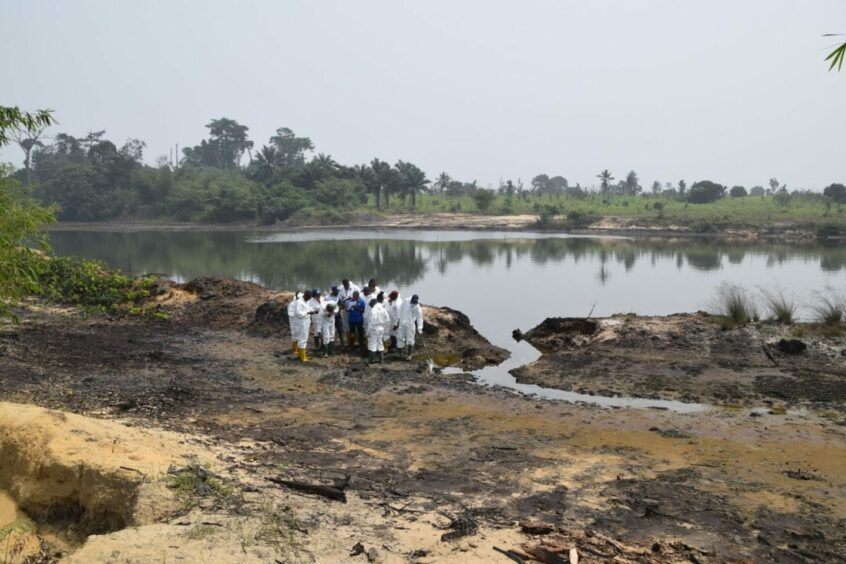
Nigeria has long had issues with safety, not least in keeping workers safe from militants. The government has shown little sign of tackling the problem among legal operations, let alone the safety challenges of widespread illicit bunkering and refining.
Over the last 10 years, local companies have seized the advantage of IOCs exiting Nigeria to acquire mature assets. These assets pose challenges, though, in their ageing infrastructure and historic difficulties with local communities.
A number of recent incidents have highlighted the safety challenge in Nigeria.
In November 2021, a wellhead owned by Aiteo Group began spraying crude into the Santa Barbara River, taking around one month to stop the spill. An explosion in February 2022 destroyed the 50-year old Trinity Spirit FPSO, leaving a number of workers dead and widespread pollution.
Furthermore, with rampant theft and illicit refining in the Niger Delta, accidents are never too far away. Most commonly these involve spills and deficient environmental processes but, on occasion, there are major incidents. A fire at an illegal refinery in Imo State, in April this year, killed more than 100 people.
Oil theft has increased in recent months, according to a number of reports. Nigeria’s official production has dropped over the last few months, with Nigerian Upstream Petroleum Regulatory Commission (NUPRC) estimating the country lost $1 billion to theft in the first quarter.
Nigeria’s government has limited leeway to tackle the insurgency in the Niger Delta. High costs on servicing its debt, combined with subsidy payments, leave it struggling for cash, making a newly energised amnesty programme unlikely.
Companies tend to blame most spills on insecurity. The exact split between unintentional error and criminality in terms of oil losses is hotly debated. However, it is clear that Nigeria has a major spill problem.
Shell sells on the seashore
National Oil Spill Detection and Response Agency (NOSDRA) data for 2021 reports Mobil Producing Nigeria (MPN), ExxonMobil’s local unit, as having spilled more than 12,000 barrels in 30 incidents. Shell Petroleum Development Co. (SPDC) had 150 spills, with a reported volume of 4,120 barrels.
It is significant that these are the onshore joint venture units of the IOCs. Shell is working on selling down its onshore exposure and Exxon has struck an agreement to sell MPN.
Once these companies have sold off the assets, it does not mean the spills will stop.
NOSDRA reported in late June a spill on OML 18, now owned by Eroton, which SPDC sold in 2015 for a cool $737 million. The Shell unit also previously owned the licence where Aiteo’s spill occurred, OML 29, which garnered the IOC $1.7 billion in another 2015 sale.
Valuations have been high and the new indigenous operators are pushing to scale up production – and pay down debts. Acquiring infrastructure that may have been in operation for decades would require cash for maintenance that may be impossible.
“There is the potential for things to get worse for communities in the Niger Delta, on top of the decades of oil spills and gas flaring, as domestic companies take over,” said Stakeholder Democracy Network’s (SDN) Calvin Laing. “Domestic companies spill more oil and flare more gas per barrel of oil they produce.”
One potentially positive note is that these domestic companies may be able to deal with local communities better, Laing said.
Regulator soup
The SDN official highlighted the financial challenge that these local companies will face. The joint ventures were often short of funds, with Nigerian National Petroleum Corp. (NNPC) struggling to cover it share of spending.
The IOCs had a number of options to try to resolve this, including their ability to help raise financing. An indigenous company with substantial debt will struggle to raise more.
The Nigerian Midstream and Downstream Petroleum Regulatory Authority (NMDPRA) and Nigerian Upstream Petroleum Regulatory Commission (NUPRC) have authority to oversee health, safety and environmental matters. However, the two agencies have shown little inclination to push for substantive improvements and, thus far, enforcement is haphazard.
SDN’s Laing said the recently passed Petroleum Industry Act (PIA) provided little clarity on these issues.
“This is a step in the wrong direction. There should be a separation between the regulator, who is trying to maximise production, and the people who are trying to protect the environment.”
It is too early to say accidents such as Aiteo’s Santa Barbara spill become more likely as a result of asset transfers. However, it is clear that it needs more attention. Part of this would require Nigeria scaling up its domestic emergency response capacity.
